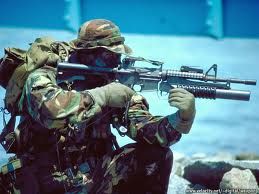SEALs to be Honored in Secret
The highly secretive Navy SEAL team that killed Osama bin Laden will likely be honored in the only way such a covert group can be: in private with nobody but themselves and their commanders in the know.
Quietly recognizing heroic actions for clandestine operations is not new in the military. Some service members wear war decorations but refuse to talk about how they earned them. Others stash away their medals, either because they've been ordered to hide them or they have chosen to for their own security.
And there are those heroes who have never lived to see a medal, their families sworn to secrecy until they were honored posthumously. For the elite few who dropped from the sky into the walled compound in Pakistan, they must carry on without breathing a word about their participation in Sunday's spectacular raid that eliminated the world's most-wanted terrorist.
It is a secret that surely must burn in their souls, but military officials say they have no doubt it will be kept. The stakes are too high.
The Navy still hasn't confirmed its SEALs carried out the much-lauded, 40-minute operation. But privately, Rear Adm. Edward Winters, at Naval Special Warfare Command in California, sent an email congratulating his forces and reminding them to keep quiet because "the fight is not over."
Winters is the chief of the elite SEAL unit officially known as Naval Special Warfare Development Group, or "DEVGRU," which is made up of only a few hundred personnel based in Dam Neck, Va. They call themselves "the quiet professionals."
Team members' names won't be released for their personal safety, said Naval Petty Officer 2nd Class John Scorza, a spokesman for the Naval Special Warfare Command.
"I can understand the conundrum that commanders are in about how much can you tell," said defense analyst Paul Giarra, a retired U.S. naval officer. "Because it's news that's good for morale and it also makes it clear to al-Qaida that they're losing. That's important. They need to know they're losing."
Revealing too much, on the other hand, can give the upper hand to groups like al-Qaida, Giarra said.


